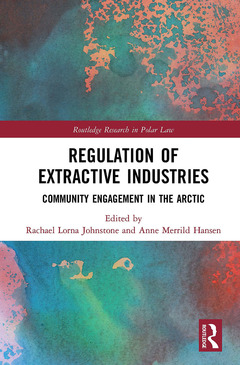Regulation of Extractive Industries Community Engagement in the Arctic Routledge Research in Polar Law Series
Coordonnateurs : Johnstone Rachael Lorna, Hansen Anne Merrild

This book intends to inform the key participants in extractive projects ? namely, the communities, the host governments and the investors ? about good practice for effective community engagement, based on analysis of international standards and expectations, lessons from selected case-studies and innovations in public participation.
The extent of extractive industries varies widely around the Arctic as do governmental and social attitudes towards resource development. Whilst most Arctic communities are united in seeking investment to fund education, healthcare, housing, transport and other essential services, as well as wanting to benefit from improved employment and business opportunities, they have different views as to the role that extractive industries should play in this. Within each community, there are multiple perspectives and the goal of public participation is to draw out these perspectives and seek consensus. Part I of the book analyses the international standards that have emerged in recent years regarding public participation, in particular, in respect of indigenous peoples. Part II presents six case studies that aim to identify both good and bad practices and to reflect upon the distinct conditions, needs, expectations, strategies and results for each community examined. Part III explores the importance of meaningful participation from a corporate perspective and identifies some common themes that require consideration if Arctic voices are to shape extractive industries in Arctic communities.
In drawing together international law and standards, case studies and examples of good practice, this anthology is a timely and invaluable resource for academics, legal advisors and those working in resource development and public policy.
Contributor Biographies
Table of Abbreviations and acronyms
Chapter One- Introduction
Rachael Lorna Johnstone and Anne Merrild Hansen
Chapter Two- Indigenous rights and resource development in the Arctic: an overview of international standards and principles for consultation, participation and consent
Emma Wilson
Chapter Three- What is required for Free, Prior and Informed Consent and where does it apply?
Rachael Lorna Johnstone
Chapter Four- Meaningful stakeholder engagement as an aspect of risk-based due diligence between the economy, politics and law: the constitutive role of the Business & Human Rights regime
Karin Buhmann
Chapter Five- Youth as a Resources in Extractive Industry Decision-Making Processes: a Case Study using Social Media and Visual Methods to Engage Young Greenlanders
Anna-Sofie Skjervedal
Chapter Six- Comparative expectations of resource development in selected Greenland communities
Rachael Lorna Johnstone and Anne Merrild Hansen
Chapter Seven- „Our consent was taken for granted." A relational justice perspective on participation of Komi people in oil development in northern Russia
Julia Loginova and Emma Wilson
Chapter Eight- Local views on oil development in a village on the North Slope of Alaska
Anne Merrild Hansen and Panigruaq Ipalook
Chapter Nine- Land Claims Agreements in Canada and the promise of enhanced participation
Nigel Bankes
Chapter Ten- Participation in a Small Archipelago: the Shetland negotiations
James Mitchell
Chapter Eleven- The relationship between host government contracts for oil and gas activities and public participation
Eduardo Guedes Pereira and Marianthi Pappa
Chapter Twelve- Achieving Excellence in Public Participation and Consultation
Penny Norton
Chapter Thirteen- Arctic Voices: Strategies for Community Engagement
Anne Merrild Hansen and Rachael Lorna Johnstone
Rachael Lorna Johnstone is adjunct professor of law at Ilisimatusarfik (University of Greenland) and professor of law at the University of Akureyri, Iceland.
Anne Merrild Hansen is professor of social science and director of the PhD school at Ilisimatusarfik and professor in planning and impact assessment in the Arctic at Aalborg University, Denmark. Between 2016 and 2018, Rachael and Anne directed the Arctic Oil and Gas Research Centre at Ilisimatusarfik.
Date de parution : 12-2021
15.6x23.4 cm
Date de parution : 03-2020
15.6x23.4 cm
Thèmes de Regulation of Extractive Industries :
Mots-clés :
ILO C169; Public Engagement; Arctic; Human Rights Due Diligence; Extractive Industries; UN; Community Engagement; UNDRIP; UN Declaration on the Rights of Indigenous Peoples UNDRIP; FPIC; public participation process; Clyde River; human rights standards; Modern Land Claim Agreements; international law; FPIC Process; environmental law; Due Diligence Guidance; development decision-making; Extractive Projects; Greenland; Aarhus Convention; Iceland; Meaningful Stakeholder Engagement; Russia; Alaska; Impact Assessment Processes; Shetland Isles; Land Claims Agreements; Norway; Due Diligence Process; Oil Extraction; East Greenlanders; Engagement; Oil Development; mineral discovery; Komi Republic; cultural heritage; North Greenland; polar law; Extractive Sector; natural resources law; Human Rights; mineral law; Indigenous Rights; Meaningful Community Engagement



